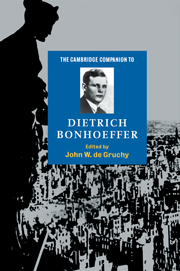Book contents
4 - Bonhoeffer's literary legacy
from Part one - Bonhoeffer's Life and Legacy
Published online by Cambridge University Press: 28 May 2006
Summary
Perhaps because they provide us with no self-evident hermeneutical key by which to understand them, Bonhoeffer's writings have served as 'a veritable Rorschach test' for late-modern theology. Yet they do not comprise a systematic theology, and even his longer writings did not appear according to any overall plan. One might conclude then that it is his remarkable life, not the substance of his thought and writing, that provides Bonhoeffer's legacy with its coherence, its integrity. But until now, despite the plethora of works that have been and still are being written about him, no one could judge the relative significance of the life and the work, lacking as we have the written legacy in its entirety.
At last, with the emergence of the Dietrich Bonhoeffer Werke (DBW) - and with the English translation of this critical edition (DBWE) well underway - we can view the entire written legacy, resisting all temptations to reduce Bonhoeffer's enduring significance to his remarkable biography alone. This literary estate now stands before us, virtually complete, demanding of students at least as much attention as they would grant the life, to which Bonhoeffer's works lend their testimony. His writings provide not only an example of intellectual and theological preparation for the reconstruction of German culture after the war but also a rare insight into the vanishing world of the old social and academic elites. His thought resonates with a prescience, subtlety and maturity that continually belies the youth of the thinker.
- Type
- Chapter
- Information
- The Cambridge Companion to Dietrich Bonhoeffer , pp. 71 - 92Publisher: Cambridge University PressPrint publication year: 1999
- 1
- Cited by



